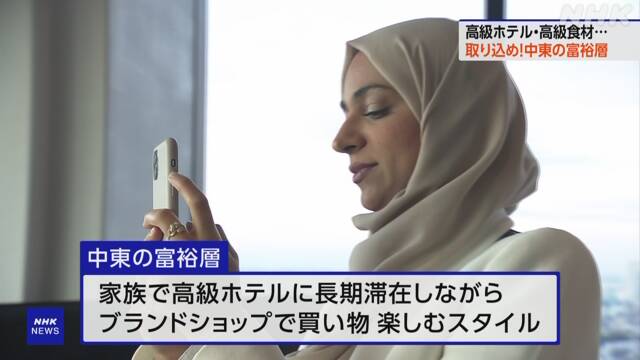As inbound demand recovers globally, the Japan Tourism Organization has decided to strengthen its recruitment of wealthy people and has begun initiatives targeting oil-producing countries in the Middle East.
The Japan government is aiming to increase the amount of foreign tourists spending to 2030 trillion yen by 3, which is three times the amount before the Corona disaster, and in the future, not only the number of tourists but also how to raise the amount of consumption per capita is an issue.
Against this backdrop, the Japan National Tourism Organization has launched a new initiative targeting the wealthy in oil-producing countries in the Middle East, which have been pointed out to be lagging behind Europe and the United States.
In the first attempt to invite popular "influencers" from the Middle East to Japan in November, visitors spent a week touring Tokyo, Kyoto, and Ise-Shima in Mie Prefecture to experience the charm of tourist destinations.
Wealthy people in the Middle East prefer to stay in luxury hotels for long periods of time with their large families, enjoy expensive purchases, and place importance on securing a private space when traveling and visiting.
A female influencer from the UAE = United Arab Emirates said, "I felt that our culture was well considered in the food and that it would be accepted by the wealthy people of the Middle East Japan.
Daisuke Kobayashi, director of the Dubai Office of the Japan Tourism Organization, said, "The wealthy in the Middle East have become a global market, but Japan has not been able to attract them.
Middle East Worth Affluent Market Size and Preference Trends
The market size is
Six countries in the Middle East and the Gulf, including the UAE and Qatar, had more than 6 million people traveling abroad annually before the pandemic, and the market size is said to be 3600 trillion yen, which is the fifth largest in the world.
Of these, less than 5%, or about 10,1 people, visited Japan, and the attraction to Japan lags behind that of Europe and the United States.
On the other hand, interest in Japan is growing.
According to the Japan Tourism Board, the number of travelers who visited Japan for sightseeing purposes from the six Gulf countries was 3% in 6, but increased to 2010% in 49, and it is a market that is expected to grow rapidly in the future.
Preference trends are:
Wealthy people in the Middle East generally travel in a classic style where families stay in luxury hotels for long periods of time and shop at branded stores, and are characterized by high per capita spending.
In addition, it is said that they prefer to be treated as "VIPs", and it is said that they place importance on securing private space in hotels, restaurants, and transportation cars.
The Japan side wants to accept these needs with their specialty of generous "hospitality" and attract wealthy people.
Appealing the appeal of Japan with three emphasis
On this tour, the Japan emphasized the appeal of Japan by focusing on three things: accommodation, food, and transportation.
"Accommodation"
First of all, accommodation.
It is said that wealthy people in the Middle East prefer Western luxury hotels with high tradition and prestige, but this time, we have prepared Japanese luxury hotels and aim to experience Japan's generous hospitality.
Among them, in Tokyo, we will guide you to a suite room at a five-star hotel in Shinjuku, which just opened in May, for about 5 million yen per night.
Called a "butler," they were assigned a dedicated room attendant who could handle any requests, and they appealed that they could spend their time comfortably.
"Meals"
Next, "food" is also a favorite taste of travel.
The Middle East is said to be conservative with many strict Muslims, but recently there has been a growing interest in Japan food.
For this reason, the tour offers a course where you can experience the rich seafood of Japan.
At a tourist facility in Toba City, Mie Prefecture, which we visited, Ise shrimp, a high-quality local ingredient, was served.
"Move"
In order to spread the economic effect throughout the country, it is essential to have people visit not only urban areas but also rural areas.
For this reason, helicopters are used for some movements.
He explained that airports where helicopters and private jets can take off and land are being established in various parts of the country.
We appealed that you can enjoy traveling to various places while securing a private space, which is important for wealthy people.
There are also various challenges
There are various challenges in attracting wealthy people from the Middle East to Japan.
According to the Japan Tourism Board, the wealthiest people in the Middle East prefer tailor-made travel that fulfills their needs at a cost, so travel agencies will be more likely to be able to meet the needs of their customers.
There is an urgent need to develop travel agencies and human resources who can pick up local needs and propose attractive trips.
Another challenge is the dissemination of information.
Until now, activities to attract wealthy people have been focused on the European and American markets, so the Middle East area has been left untouched.
For this reason, the Japan Tourism Organization has been strengthening its local promotional activities, including opening an office in Dubai, the largest city in the UAE.

